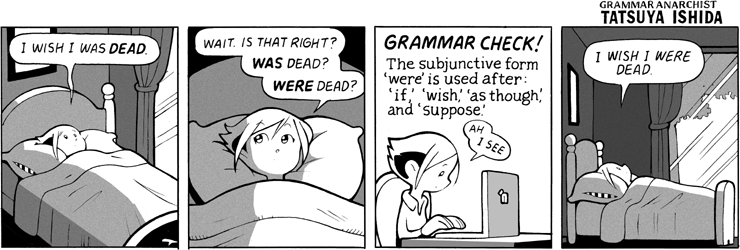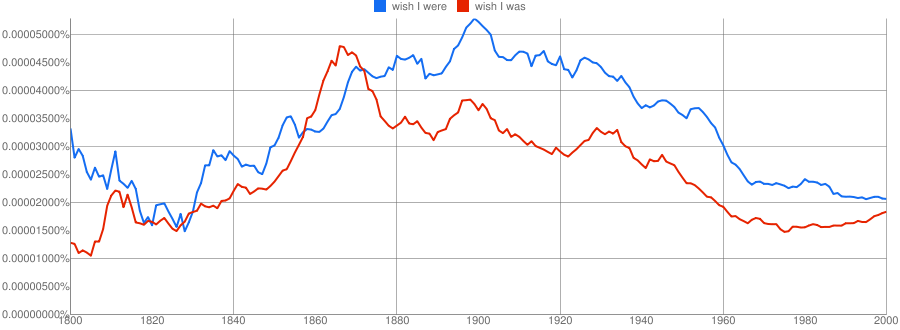
But in fact there's more here to distract Monique from her depression than the simple question of whether to say "I wish I were" or "I wish I was". As Geoff Pullum noted in a comment on a Language Log post back in 2004, this use of were
… isn't actually the subjunctive. People often call the "were" of "I wish I were" subjunctive, but that term is much better used (as in The Cambridge Grammar of the English Language) for the construction with "be" seen in "I demand that it be done." The "were" form is often wrongly called a past subjunctive, but of course "it were done" is not a past tense of "it be done". The difference between the two is that the subjunctive construction occurs with any verb: "I demand that this cease" is a subjunctive (notice "this cease", not "this ceases"). The relic form in "I were" is only available for "be". For all other verbs you use the preterite: "I wish I went to New York more often." The Cambridge Grammar calls the "were" form the irrealis form. It is surviving robustly in expressions like "if I were you", but even there it has a universally accepted alternate "if I was you", and there is no semantic distinction there to preserve.
And she should feel OK about her original mode of expression, as I noted in the same post, quoting the American Heritage Book of English Usage:
… over the last 200 years even well-respected writers have tended to use the indicative was where the traditional rule would require the subjunctive were. A usage such as If I was the only boy in the world may break the rules, but it sounds perfectly natural.
In fact, rather than looking up the "rule" in some grammar scold's list, she could have discovered this puzzling graph of her choice's history:

This is turn would raise a host of other questions: Why did "wish I was" surge to the front in the late 1860s? Why did "wish I were" regain the lead, peaking in 1900? And what about the larger shape of the Great Victorian Wistfulness Bubble, with that long climb from 1830 and the subsequent decline in both of these expressions?
With any luck, by the time Monique finished exploring these questions online, she'd be too tired to be depressed.
Update — Well, if we're going to get serious about this (and LL commenters are a pretty earnest and sober bunch, it seems), then we should start by reading what Arnold Zwicky had to say in response to Geoff's comment: "'Losing' 'the subjunctive'", 7/11/2004.
Source: http://languagelog.ldc.upenn.edu/nll/?p=3038
No comments:
Post a Comment